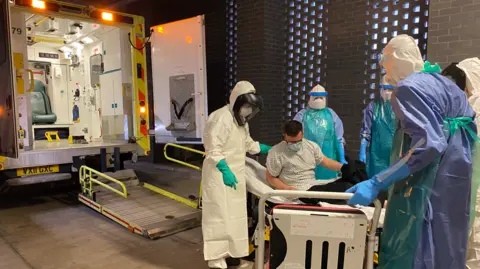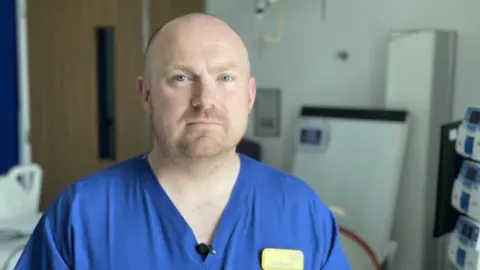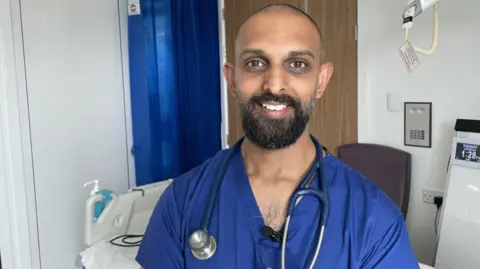Hospital creates specialised pandemic unit
 BBC
BBCA hospital in Bristol has become a designated treatment centre for patients who catch dangerous airborne infectious diseases such as avian flu.
Southmead Hospital is now one of seven sites in the country now designed to care for adults with airborne high consequence infectious diseases (HCID).
It means that if someone requires inpatient or critical care for avian flu they can be treated in a dedicated isolation unit or space in the intensive care unit (ICU).
Consultant in intensive care medicine at the hospital, Dr Scott Grier, said: "If and when there was another pandemic we are now well placed to admit some of those patients early on."

The hospital has developed processes for the isolation of HCID patients to ensure the safety of staff and other patients.
The processes were recently tested in a training exercise which involved South Western Ambulance Service NHS Foundation Trust transporting a fake patient with avian flu through basement corridors in the hospital.
Dr Grier said they were now better prepared for future pandemics and would share that knowledge across the country.
He explained they had customised a part of the ICU to look after a highly infectious patient saying it was now "even safer" than it was before in terms of ventilation and seals.
HCIDs are rare in the UK so the number of patients likely to require treatment at Southmead will be low.

Dr Ankur Gupta-Wright, one of the HCID lead consultants at Southmead Hospital, said: "Day to day, if we do get cases, it will be helpful because it means we can manage patients closer to home if they're in the South West or the Midlands.
"And if and when there is a pandemic we'll have a lot more resilience through this unit."
He said there had previously been five centres to manage infectious diseases in the country but they had been in London or the North.
"There was a big geographical gap so NHS England commissioned two new HCID centres including our one," he said.
Chief nursing officer, Professor Steve Hams, added: "This achievement reflects the significant growth and development of our infectious diseases team at North Bristol NHS Trust in recent years, and highlights our emergence as a true centre of excellence for expert, compassionate care."
Follow BBC Bristol on Facebook, X and Instagram. Send your story ideas to us on email or via WhatsApp on 0800 313 4630.
